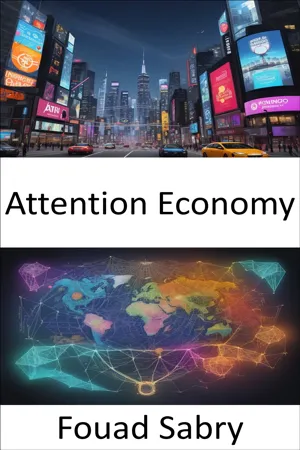
- English
- ePUB (mobile friendly)
- Available on iOS & Android
About This Book
What is Attention Economy
The treatment of human attention as a limited commodity and the application of economic theory to the resolution of a variety of information management issues are the two main components of the attention economics approach to the management of information. This is what Matthew Crawford has to say about attention: "Attention is a resource-a person has only so much of it." This concept is expanded upon by Thomas H. Davenport and John C. Beck, who state that attention is defined as the mental engagement that is focused on a specific piece of information. We become aware of certain things, we focus our attention on a specific set of things, and then we decide whether or not to take action.
How you will benefit
(I) Insights, and validations about the following topics:
Chapter 1: Attention economy
Chapter 2: Economics
Chapter 3: Ronald Coase
Chapter 4: Environmental economics
Chapter 5: Free-rider problem
Chapter 6: Externality
Chapter 7: Market failure
Chapter 8: The Nature of the Firm
Chapter 9: Index of economics articles
Chapter 10: Transaction cost
Chapter 11: Behavioral economics
Chapter 12: Law and economics
Chapter 13: Coase theorem
Chapter 14: Pigouvian tax
Chapter 15: Information overload
Chapter 16: Theory of the firm
Chapter 17: Armen Alchian
Chapter 18: New institutional economics
Chapter 19: Property rights (economics)
Chapter 20: Digital marketing
Chapter 21: Willingness to accept
(II) Answering the public top questions about attention economy.
(III) Real world examples for the usage of attention economy in many fields.
Who will benefit
Professionals, undergraduate and graduate students, enthusiasts, hobbyists, and those who want to go beyond basic knowledge or information for any kind of attention economy.
Frequently asked questions
Information
Table of contents
- Chapter 1: Attention economy
- Chapter 2: Economics
- Chapter 3: Ronald Coase
- Chapter 4: Environmental economics
- Chapter 5: Free-rider problem
- Chapter 6: Externality
- Chapter 7: Market failure
- Chapter 8: The Nature of the Firm
- Chapter 9: Index of economics articles
- Chapter 10: Transaction cost
- Chapter 11: Behavioral economics
- Chapter 12: Law and economics
- Chapter 13: Coase theorem
- Chapter 14: Pigouvian tax
- Chapter 15: Information overload
- Chapter 16: Theory of the firm
- Chapter 17: Armen Alchian
- Chapter 18: New institutional economics
- Chapter 19: Property rights (economics)
- Chapter 20: Digital marketing
- Chapter 21: Willingness to accept
- Epilogue
- Appendix
- About the Author